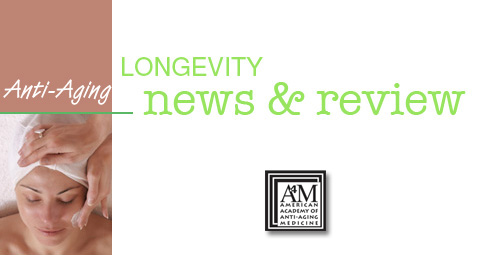|
[home] [subscription form] [cover story] [introduction] [people and places] [medical spa destinations]
|
||

Longevity News and Review provides readers with the latest information in breakthroughs pertaining to the extension of the healthy human lifespan. These news summaries are compiled by the American Academy of Anti-Aging Medicine (A4M; www.worldhealth.net), a non-profit medical society composed of 20,000 physician and scientist members from 90 nations, united in a mission to advance biomedical technologies to detect, prevent, and treat aging related disease and to promote research into methods to retard and optimize the human aging process. Dr. Ronald Klatz, M.D., D.O., A4M President, and Dr. Robert Goldman, M.D., Ph.D., D.O., FAASP, physician co-founders of the anti-aging medical movement, distill these headlines and provide their insightful commentary.
BACKGROUND TO THE A4M PRINCIPALS
VOLUME 2007 chapter 1
Vitamin D Supplements Add Years to Your Life … Maybe?
The therapeutic role of vitamin D, "the sunshine vitamin," for bone health, has become well established. A number of recent studies have correlated vitamin D deficiency with adverse health consequences, such as cancer, cardiovascular disease, high blood pressure, type 2 diabetes, and some infectious diseases. A meta-analysis of these studies, completed by Edward Giovannucci, M.D., Sc.D., of the Harvard School of Public Health (Boston, MA USA), found that those individuals taking vitamin D supplements had a 7% lower risk of death than those who did not supplement. "The intake of ordinary doses of vitamin D supplements seems to be associated with decreases in total mortality rates," concluded Dr. Giovannucci and his colleagues. [Giovannucci E., "Can Vitamin D Reduce Total Mortality?" Arch Intern Med. 2007;167:1709-1710.]
Dr. Klatz observes: "The role of vitamin D as a protective nutrient against cancer has been under frequent scrutiny by researchers, as is the case with so many natural/nutritional therapeutics. Most recently, a far smaller study [Freedman DM, Looker AC, Chang SC, Graubard BI." Prospective Study of Serum Vitamin D and Cancer Mortality in the United States." J Natl Cancer Inst. 2007 Oct 30; [Epub ahead of print]] indicated no benefit of vitamin D as a cancer protectant. Until the weight of more substantial research rules against it, vitamin D supplementation is a prudent option for those who cannot obtain vitamin D otherwise (via daily sun exposure)."
Exercise with Supplements Benefits Older Adults
Aging is associated with lower muscle mass and an increase in body fat. Mark Tarnopolsky, of McMaster University (Hamilton, Ontario, Canada) and colleagues studied the effect of exercise and two dietary supplements, creatine (an amino acid produced in the body to provide short bursts of energy to muscle cells) and conjugated linoleic acid (a fatty acid, supplementation of which has reduced body fat in animal studies), on muscle and body fat in older adults. The researchers studied 19 men and 20 women age 65% for a six-month period. All subjects participated in strength-training exercise twice a week. Half took creatine and conjugated linoleic acid supplements every day, whereas the remainder of subjects were given placebo (fake supplements). By the end of the six-month study period, the researchers found that the group taking the supplements was able to work their muscles for a longer period, had greater strength in their thigh muscles, and demonstrated greater reductions in body fat. [Tarnopolsky M, Zimmer A, Paikin J, Safdar A, Aboud A, Pearce E, Roy B, Doherty T." Creatine monohydrate and conjugated linoleic Acid improve strength and body composition following resistance exercise in older adults."
PLoS ONE. 2007 Oct 3;2(10):e991.;Print
Remarks Dr. Goldman: "Confirming studies are needed, bug this study shows the potential therapeutic role of two supplements, creatine and conjugated linoleic acid, to boost muscle strength and mass while reducing body fat. In the meantime, aging adults need to understand the value of strength training. It benefits strength, muscle endurance, body composition, blood markers, and functional performance and improves health and well-being."
The Dental-Dementia Link
Numerous studies have linked dementia, the progressive loss of intellectual abilities of sufficient severity to interfere with social or occupational functioning, to the subsequent deterioration of oral health. A study completed by Pamela Sparks Stein of the University of Kentucky ((USA) and colleagues has established tooth loss as a predictor for the onset of dementia later in life.
The researchers analyzed dental records and brain function test results amassed over a twelve-year period for 144 participants in the Nun Study, a longitudinal study of aging and Alzheimer disease. Among the subjects who were free of dementia at the first cognitive exam, those with no teeth or fewer than nine teeth had a two-fold or greater increased risk of dementia, as compared to those having 10 or more teeth.
[Stein PS, Desrosiers M, Donegan SJ, Yepes JF, Kryscio RJ. " Tooth loss, dementia and neuropathology in the Nun Study." J Am Dent Assoc. 2007 Oct;138(10):1314-22.]
Comments Dr. Klatz: "The mouth is often overlooked by medical practitioners as a source of disease. An estimated 500 species of microorganisms live in the mouth, and each individual organism readily and rapidly reproduces in that warm, dark, moist environment. The mouth contains tissues that are highly absorbent, thus giving these microorganisms direct entry access to your body. Indeed, some experts have found a proven causal association between poor periodontal health and cardiovascular disease, why not with Alzheimer's disease?"
